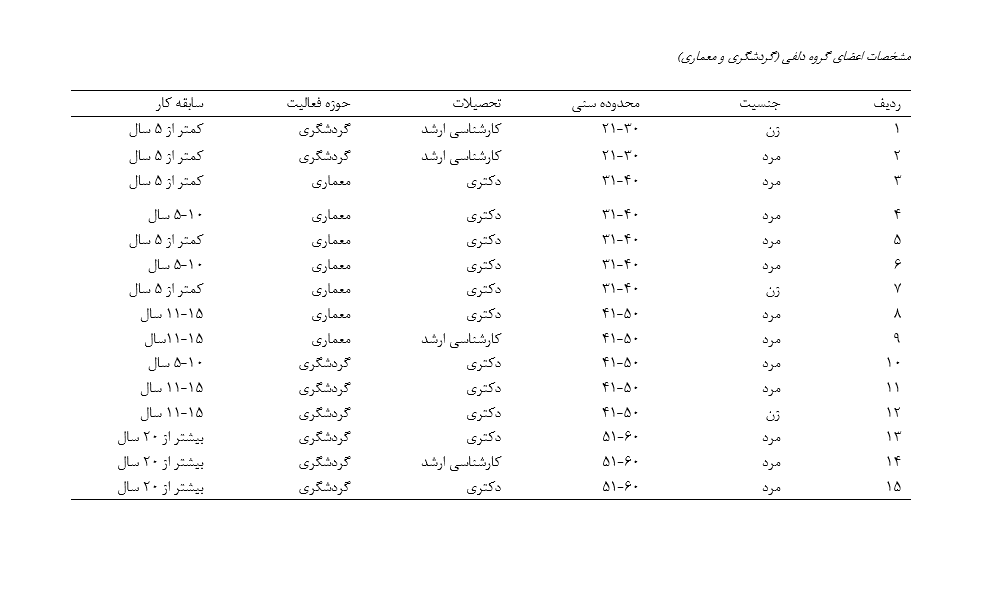Formulating and Prioritizing Environmental Sustainable Architecture Indicators Affecting the Prosperity of Ecotourism Lodges in Mazandaran Province Using the Fuzzy Delphi Method
Keywords:
Sustainable Architecture, Green Architecture, Eco-Lodges, Tourism Development, Mazandaran, DelphiAbstract
This study aimed to investigate the effect of environmental sustainable (green) architecture on the prosperity of ecotourism lodges in Mazandaran Province. This research is qualitative and employed the Fuzzy Delphi method. The statistical population included experts in the field of architecture and tourism as well as lodge owners in Mazandaran Province, from whom 15 individuals were purposefully selected. The tools used in this study included expert-oriented questionnaires. Based on the Fuzzy Delphi approach and expert-oriented questionnaires, final variables were identified and categorized. The findings included the following: quantitative and qualitative environmental development encompassing 1) adherence to and improvement of environmental quality (both natural and human), 2) professional interior design and innovation in infrastructure and exterior facades, 3) size and extent of the environment, and 4) environmental protection and cleanliness. Vernacular architecture included 1) revival and application of vernacular architecture, 2) simple vernacular interior architecture, 3) vernacular structure of products, services, and tourism activities, and 4) simple vernacular interior architecture. Eco-friendliness included 1) compatibility with the natural environment, 2) use of natural materials in vernacular interior architecture, 3) natural materials in vernacular interior architecture to reduce energy consumption and enhance environmental sustainability, 4) adaptation and harmony with the environment, and 5) avoidance of using environmentally incompatible building materials. Environmental sustainability included 1) use of green spaces and better water utilization, 2) use of green technologies such as solar panels, 3) use of clean and alternative energies, and 4) selection of tourism locations based on their setting (mountain-plain-forest). Economic factors included 1) expansion and development of lodges, 2) increase in temporary and seasonal employment, 3) development of local jobs and entrepreneurship leading to increased welfare and regional income, and 4) increase in income and welfare of local cities and regions. Socio-cultural factors included 1) reverse migration to villages, 2) occurrence of cultural changes, and 3) rural growth and development. Cost-benefit analysis included 1) affordability of ecotourism lodges, 2) reduction in travelers’ accommodation costs compared to hotels, and 3) investment in ecotourism lodges with significant financial returns.
Downloads
References
Banham, R. (2022). Architecture of the Well-Tempered Environment. University of Chicago Press.
Chin, C. H., Law, F. Y., Lo, M. C., & Ramayah, T. (2018). The Impact of Accessibility Quality and Accommodation Quality on Tourists' Satisfaction and Revisit Intention to Rural Tourism Destination in Sarawak: The Moderating Role of Local Communities' Attitude. Global Business and Management Research, 10(2), 115-127.
Falatoonitoosi, E., Schaffer, V., & Kerr, D. (2022). Does Sustainable Tourism Development Enhance Destination Prosperity? Journal of Hospitality & Tourism Research, 46(5), 1056-1082. https://doi.org/10.1177/1096348020988328
Guo, W., Wang, J., Li, C. Z., & Zhang, Y. Q. (2022). Not Worrying About Less But About Inequality: Can Developing Tourism Promote Common Prosperity?-Analysis Based on CFPS (2010-2018) Data.
Iannucci, G., Martellozzo, F., & Randelli, F. (2022). Sustainable Development of Rural Areas: A Dynamic Model in Between Tourism Exploitation and Landscape Decline. Journal of Evolutionary Economics, 32(3), 991-1016. https://doi.org/10.1007/s00191-022-00785-4
Ismail, F., Imran, A., Khan, N., & Qureshi, M. I. (2021). Past, Present, and Future of Ecotourism: A Systematic Literature Review from Last Decade. Studies of Applied Economics, 39(4). https://doi.org/10.25115/eea.v39i4.4592
Kalaitan, T. V., Stybel, V. V., Gutyj, B. V., Hrymak, O. Y., Kushnir, L. P., Yaroshevych, N. B., Vovk, M. V., & Kindrat, O. V. (2021). Ecotourism and Sustainable Development: Prospects for Ukraine. Ukrainian Journal of Ecology, 11(1), 373-383.
Khanra, S., Dhir, A., Kaur, P., & Mäntymäki, M. (2021). Bibliometric Analysis and Literature Review of Ecotourism: Toward Sustainable Development. Tourism Management Perspectives, 37, 100777. https://doi.org/10.1016/j.tmp.2020.100777
Khosla, R., Miranda, N. D., Trotter, P. A., Mazzone, A., Renaldi, R., McElroy, C., Cohen, F., Jani, A., Perera-Salazar, R., & McCulloch, M. (2021). Cooling for Sustainable Development. Nature Sustainability, 4(3), 201-208. https://doi.org/10.1038/s41893-020-00627-w
Kia, Z. (2021). Ecotourism in Indonesia: Local Community Involvement and the Affecting Factors. Journal of Governance and Public Policy, 8(2), 93-105. https://doi.org/10.18196/jgpp.v8i2.10789
Kularathne, M., & Lee, H. Y. (2017). A Comparative Study of Eco-Components of Service Quality in Eco-Friendly Accommodations: Asian Tourists vs. European Tourists. 한국관광레저학회 학술발표대회, 173-180.
Motlagh, E. Y., Hajjarian, M., Zadeh, O. H., & Alijanpour, A. (2020). The Difference of Expert Opinion on the Forest-Based Ecotourism Development in Developed Countries and Iran. Land Use Policy, 94, 104549. https://doi.org/10.1016/j.landusepol.2020.104549
Ruiz-Real, J. L., Uribe-Toril, J., de Pablo Valenciano, J., & Gázquez-Abad, J. C. (2022). Rural Tourism and Development: Evolution in Scientific Literature and Trends. Journal of Hospitality & Tourism Research, 46(7), 1322-1346. https://doi.org/10.1177/1096348020926538
Snyman, S. L. (2017). The Role of Tourism Employment in Poverty Reduction and Community Perceptions of Conservation and Tourism in Southern Africa. In Tourism and Poverty Reduction.
Stolyarchuk, V. (2023). Opportunity of the Accommodation Establishment Development: A Need for Nature-Based Services and Eco-Friendly Activity. Journal of Tourism Futures. https://doi.org/10.1108/JTF-09-2022-0218
Turan, M. (2024). Vernacular Architecture: Paradigms of Environmental Response. Taylor & Francis. https://doi.org/10.4324/9781003502616
Vrabcová, P., Scholz, P., Linderová, I., & Kotoučková, H. (2024). Eco-Friendly Hotels and Guesthouses as a New Opportunity for Resilience and Sustainability: Evidence from the Czech Republic. PLoS One, 19(4), e0301936. https://doi.org/10.1371/journal.pone.0301936
Walker, K., & Moscardo, G. (2014). Encouraging Sustainability Beyond the Tourist Experience: Ecotourism, Interpretation and Values. Journal of Sustainable Tourism, 22(8), 1175-1196. https://doi.org/10.1080/09669582.2014.918134
Wang, C. C., Cater, C., & Low, T. (2016). Political Challenges in Community-Based Ecotourism. Journal of Sustainable Tourism, 24(11), 1555-1568. https://doi.org/10.1080/09669582.2015.1125908
Xiang, C., & Yin, L. (2020). Study on the Rural Ecotourism Resource Evaluation System. Environmental Technology & Innovation, 20, 101131. https://doi.org/10.1016/j.eti.2020.101131
Zhao, L. S., Li, C. Y., Chen, X. L., Wang, Q., Zhang, Y. Z., & Liu, L. N. (2022). Native Architecture and Acclimation of Photosynthetic Membranes in a Fast-Growing Cyanobacterium. Plant Physiology, 190(3), 1883-1895. https://doi.org/10.1093/plphys/kiac201 10.1093/plphys/kiac372

Downloads
Published
Submitted
Revised
Accepted
Issue
Section
License
Copyright (c) 2025 Niki Amiri (Author); Soudabeh Mehri (Corresponding Author); Abdollah Ebrahimi (Author)

This work is licensed under a Creative Commons Attribution-NonCommercial 4.0 International License.







